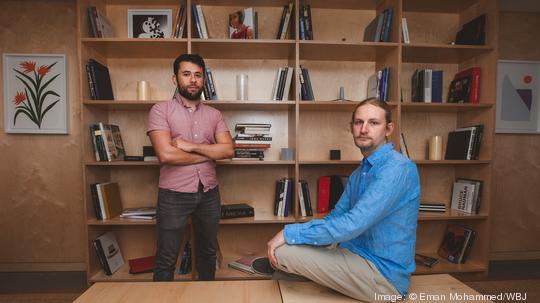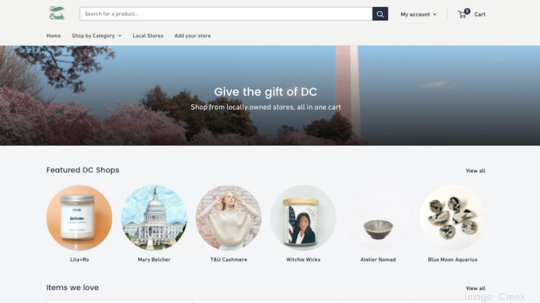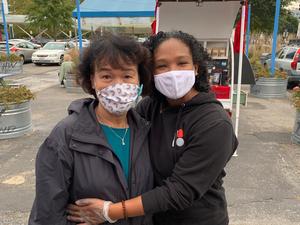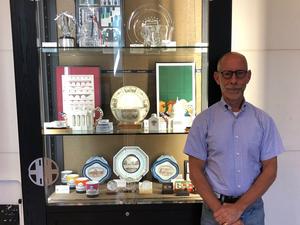
D.C. small businesses are getting a new, homegrown alternative to sites like Amazon and Etsy to help them sell their goods to customers.
Co-founders Byron Harvey and Mario Sukkar just launched online marketplace Creek in mid-August. The site is already hosting 13 D.C. vendors selling more than 700 products ranging from "51st State" baseball caps and handmade jewelry to matted prints of Ben’s Chili Bowl. By creating what they bill as a one-stop marketplace, Sukkar and Harvey hope to filter out nonlocal businesses for consumers who want to skip the in-store experience but still support local outlets with the click of a mouse or a swipe on a smartphone.
“We really do value the type of integrations we can make between neighbors and other neighbors,” said Harvey, the company’s CEO. “It’s a special opportunity if you can buy a painting from someone who lives in your neighborhood.”
The seeds of the venture were planted when Harvey, who graduated from the University of Virginia in 2017 with degrees in economics and computer science, and Sukkar, who graduated the same year with a computer science degree, got to talking about how Amazon’s stock price has soared amid the Covid-19 pandemic while many small businesses were forced to shut down. After quitting their day jobs at Yext and Twitter, respectively, Harvey and Sukkar came together to launch a pilot version of Creek in Charlottesville to test the technology enabling the platform and gauge demand.
They learned a lot about consumer behavior from that pilot, such as how people like reading lists of things and looking through items sorted by categories — and that knowledge informed their D.C. website. Consumers can browse groups of items like art, decor and stuff for the kitchen, for instance, or click on the Local Stores heading and check out what's for sale from individual vendors, including housewares retailer Atelier Nomad, apparel retailer District of Clothing, and candlemaker Witchie Wicks.

Their software was designed to automatically scrape information from participating vendors’ websites and populate it under their virtual listings on Creek, decreasing the prep time for sellers. Creek takes a 5% cut of sales — the first round of businesses got a 3% rate, but the company is increasing that for the new vendors that sign on — in addition to credit card fees. By comparison, Etsy takes a 5% cut or 3% if vendors use their internal payments service.
Sukkar, the firm's COO, and Harvey bootstrapped Creek with an initial investment of around $5,000. They received responses from prospective vendors soon after launching an ad campaign and opened the site with13 vendors — and are in talks with several more. All are based in D.C. proper, and if the site is successful, they’ll look beyond the site's boundaries or maybe establish other Creeks. For now, they’re focused on the task at hand.
“If we can nail the D.C. marketplace first, then we’ll definitely think about expanding,” Harvey said.
Among the vendors that have signed up is Mayapple Soaps, a side business started by graphic artist Amanda Frayer. The Brookland resident launched the shop, which sells handmade soaps featuring local herbs, out of self-interest. She wanted to know what she was putting onto her skin, adding that's not always clear with commercial products that are mass produced.
Frayer doesn't have an advertising budget for her soaps, which include lavender goat milk and turmeric goat milk, and was receptive when Sukkar reached out to her about selling her products through Creek.
"I had never seen anything quite like Creek, and when he explained what it was about, I got really excited about it," she said. "I'm a very small business, and reaching new customers online is challenging and expensive, but when all of these small business owners come together, it's like we pool all our resources and leverage one another and are building a community."
So do Sukkar and Harvey really think they can take on the likes of Amazon.com Inc. (NASDAQ: AMZN) or Etsy Inc. (NASDAQ: ETSY), both publicly traded giants with combined revenue of just shy of $388 billion last year? If anything, the pair points to demand — total revenue for the two e-commerce megabrands soared 38% from 2019 as online shopping got a pandemic boost. Plus, they believe they have a natural advantage over those larger companies.
"I think there is a hesitancy among small businesses to sell on Amazon, and a hesitancy among consumers to buy from there," Sukkar said, acknowledging also that the co-founders "try not to think too hard about" their differences in scale. “A big thing for us is there is just something very different about buying something from someone who lives in your area.”




